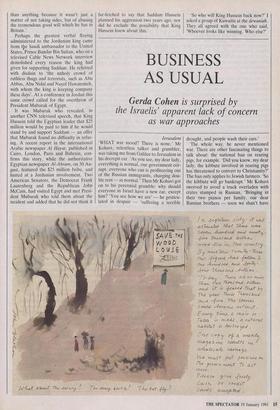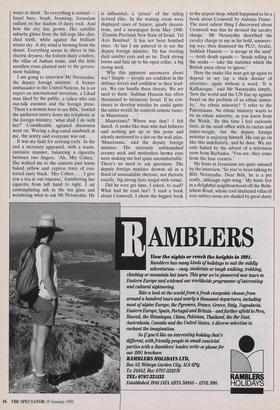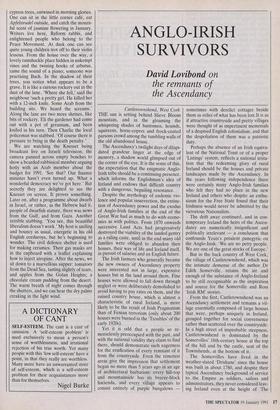BUSINESS AS USUAL
Gerda Cohen is surprised by
the Israelis' apparent lack of concern as war approaches
Jerusalem
`WHAT war mood? There is none.' Mr Kohavi, relentless talker and grumbler, was taking me from Galilee to Jerusalem in his decrepit car. 'As you see, my dear lady, everything is normal, our government cor- rupt, everyone who can is profiteering out of the Russian immigrants, charging dou- ble rent — as normal.' Then Mr Kohavi got on to his perennial grumble: why should everyone in Israel have a new car, except him? 'You see how we are' — he gesticu- lated in despair — 'suffering a terrible
drought, and people wash their cars.'
The whole way, he never mentioned war. There are other fascinating things to talk about: the national ban on rearing pigs, for example. 'Did you know, my dear lady, the kibbutz involved in rearing pigs has threatened to convert to Christianity?' The ban only applies to Jewish farmers. 'So the kibbutz will go bankrupt.' Mr Kohavi swerved to avoid a truck overladen with crates stamped in Russian, 'Bringing in their two pianos per family, our dear Russian brothers — soon we shan't have water to drink.' So everything is normal Israel busy, brash, booming; Jerusalem radiant on her diadem of dusty rock. And how the city has grown. Her satellite suburbs glitter from the hill-tops like clen- ched teeth, white against the brilliant winter sky. A dry wind is blowing from the desert. Everything seems to shiver in this electric dryness; the forlorn dusty conifers, the villas of Judean stone, and the little scentless roses planted next to the govern- ment building.
I am going to interview Mr Netanyahu, the deputy foreign minister. A former ambassador to the United Nations, he is an expert on international terrorism, a Likud man liked by the public, a talker who can out-talk enemies and the foreign press. `There's a woman here to see Bibi,' bawled the unshaven sentry down the telephone at the foreign ministry; 'what shall I do with her?' Considerable agitated discussion went on. Waving a dog-eared sandwich at me, the sentry said everyone was out.
It was my fault for arriving early. In the end a secretary appeared, with a warm, caressive manner, balancing a cigarette between two fingers. `Ah, Mrs Cohen.' She walked me to the canteen past lawns baked yellow and cypress trees of con- torted rusty black. 'Mrs Cohen . . . I give you a tea at our expense,' transferring her cigarette from left hand to right. I sat contemplating ash in the tea glass and wondering what to ask Mr Netanyahu. He is influential, a 'prince' of the ruling in-bred elite. In the waiting room were displayed cases of bizarre, gaudy decora- tions, and a newspaper from May 1948: `Zionists Proclaim New State of Israel. Tel Aviv Bombed.' It has not been bombed since. At last I am ushered in to see the deputy foreign minister. He has riveting dark sombre eyes and no tie. Dark strong brows and fuzz up to his open collar, a big strong neck.
`Why this apparent unconcern about war? Simple — people are confident in the defence forces and confident in their lead- ers. We can handle these threats. We are used to them. Saddam Hussein has often threatened to incinerate Israel. If he con- tinues to develop missiles he could ignite the entire world; he controls remote bases, in Mauretania . .
Mauretania? Where was that? I felt dazed. A snake-like man who had hitherto said nothing got up at this point and silently motioned to a dot on the wall atlas. `Mauretania,' said the deputy foreign minister. His curiously unblemished creamy neck and motionless brown eyes were making me feel quite uncomfortable. There's no need to ask questions. The deputy foreign minister drowns all in a flood of unassailable rhetoric; not rhetoric exactly, big strong facts turgid with virtue.
Did he ever get time, I asked, to read? What had he read last? 'I read a book about Cromwell. I chose the biggest book in the airport shop, which happened to be a book about Cromwell by Antonia Fraser. The most salient thing I discovered about Cromwell was that he devised the cavalry charge.' Mr Netanyahu described the cavalry charge to me in his bold, unswerv- ing way, then dismissed the PLO, Arafat, Saddam Hussein — 'a savage in the sand' — Arab death squads — 'heads rolling in the souks — take the statistics which the British press chose to ignore.'
Here the snake-like man got up again to deposit in my lap a thick dossier of atrocities, again without a word. 'It is Kafkaesque,' said Mr Natanyahu simply, `how the world and the UN line up against Israel on the problem of an ethnic minor- ity.' An ethnic minority? 'I refer to the Palestinians. No ethnic minority wants to be an ethnic minority, as you know from the Welsh.' By this time I feel curiously faint, in the small office with its cactus and paper-weight, but the deputy foreign minister is enjoying himself. He can go on like this indefinitely, and he does. We are only halted by the advent of a television crew from Barbados. 'You see, they come from the four corners.'
My hosts in Jerusalem are quite amused by the interview. `So you've been talking to Bibi Netanyahu. Dear Bibi, he is a pet really, although right-wing.' My hosts live in a delightful neighbourhood off the Beth- lehem Road, whose cool shuttered villas of rosy umber stone are shaded by great dusty cypress trees, entwined in morning glories. One can sit in the little corner café, eat Apfelstrudel outside, and catch the mourn- ful scent of jasmine flowering in January. Writers live here, Reform rabbis, and enlightened people who belong to the Peace Movement. At dusk one can see quite young children trot off to their violin lessons. From the house over the way, a lovely ramshackle place hidden in unkempt vines and the twining hooks of arbutus, came the sound of a piano; someone was practising Bach. In the shadow of their trees, you notice what appears to be a grave. It is like a curious rockery out in the dust of the lane. 'Where she fell,' said the neighbour 'such a pretty girl. He killed her with a 12-inch knife. Some Arab from the building site. We heard the screams.' Along the lane are two more shrines, like bits of rockery. Eli the gardener had come out with a pot of geranium, and been knifed in his turn. Then Charlie the local policeman was stabbed. 'Of course there is pressure to bring in the death penalty.'
We are watching the Knesset being broadcast live on Israeli television; the camera panned across empty benches to show a bearded rabbinical member arguing hotly with an Arab member about the budget for 1991. 'See that? Our finance minister hasn't even turned up. What a wonderful democracy we've got here.' But secretly they are delighted to see the Knesset on screen. It proves something. Later on, after a programme about dwarfs in Israel, or rather, as the Hebrew had it, people of dwarfish stature, there was news from the Gulf, and from Gaza. Another terrible stabbing. 'You see, this beautiful liberalism doesn't work.' My host is smiling and bouncy as usual, energetic in his old English corduroys, but he's beginning to wonder. The civil defence shelter is used for making ceramics. Their gas masks are in the cupboard with a leaflet explaining how to inject atropine. After the news, we sit down to a marvellous supper: tomatoes from the Dead Sea, tasting slightly of tears, and apples from the Golan Heights; a chocolate cream pudding from the desert. The warm breath of night comes through the shutters, and we can hear the dry palms creaking in the light wind.




















































 Previous page
Previous page